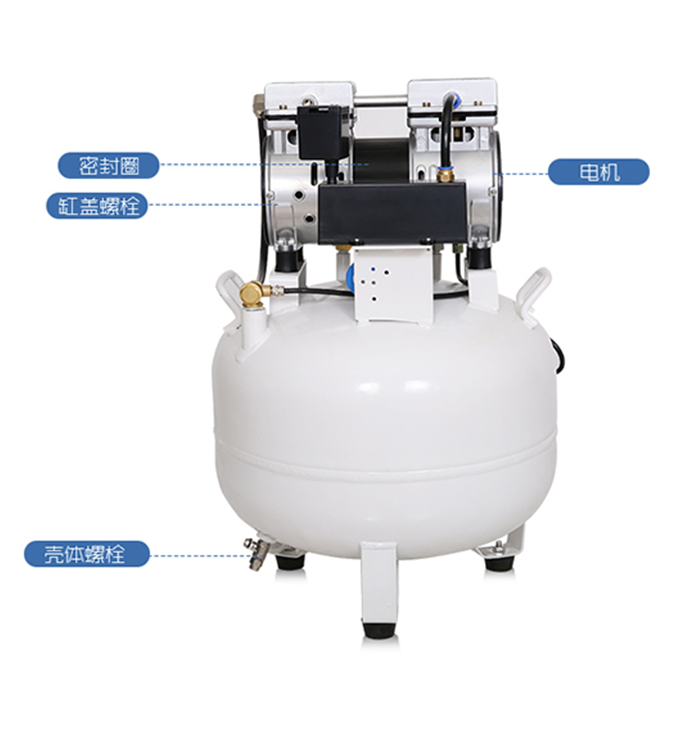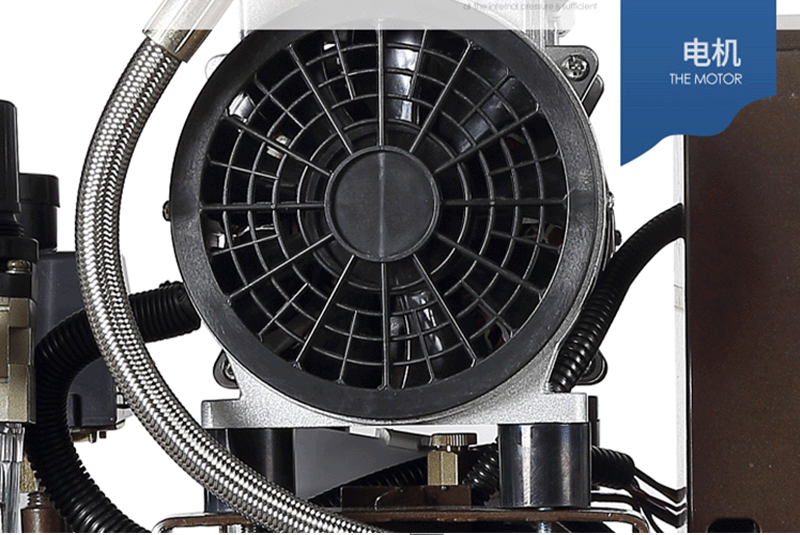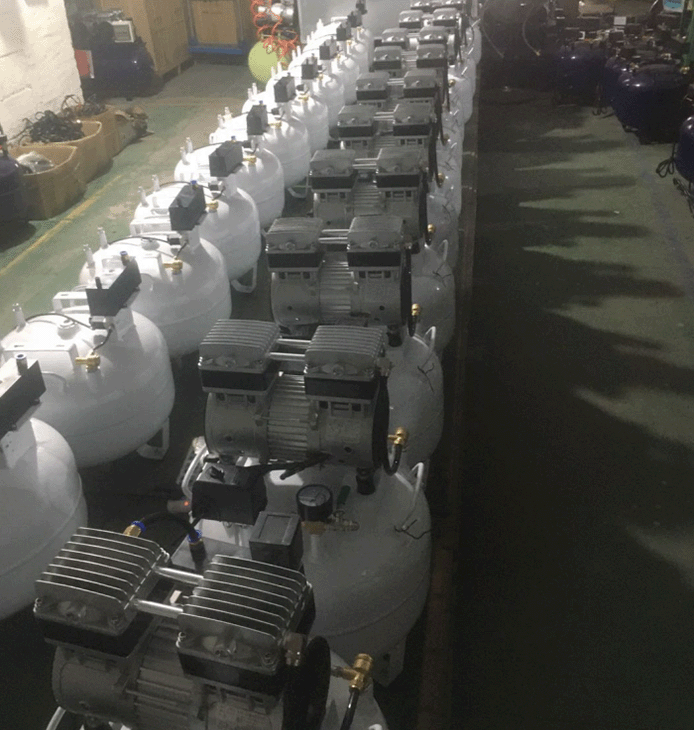Oil-Free vs Lubricated Dental Compressors: 7 Critical Factors for Clinic Air Quality
As we navigate the evolving landscape of dental technology in 2025, choosing between oil-free and lubricated dental compressors represents a critical decision for practice success. At Hager Dental, we've observed how this technical choice directly impacts patient safety, treatment outcomes, and your clinic's bottom line.
Compressed air functions as the essential foundation of modern dental operations, powering everything from basic handpieces to sophisticated CAD/CAM systems. Despite this importance, many practitioners remain unaware of how their compressor selection affects clinical results, equipment longevity, and operational costs. This comprehensive analysis examines seven evidence-based factors to guide your decision between oil-free and lubricated dental compressors.
ISO 8573-1 Air Purity Classifications: The Gold Standard
The international standard ISO 8573-1 (2010) establishes the framework for measuring compressed air purity, defining specific classifications for three primary contaminants: solid particles, water, and oil content. This classification system has become the global benchmark for assessing compressed air quality in dental applications.

Class 0 certification, the most stringent classification, guarantees air that is free from added oil aerosols, vapors, and liquids. For dental applications where even microscopic contamination can compromise patient care and damage sensitive equipment, this classification provides crucial assurance.
The standard delineates eight purity classes for solid particle contamination, ranging from Class 0 (least contaminated) to Class 7, with an additional Class X for significantly contaminated air. Similarly, it specifies classifications for water and oil content, with each class representing different concentration thresholds.
For dental practices, particularly those performing adhesive procedures or utilizing advanced CAD/CAM systems, air quality directly impacts clinical success. Oil contamination can weaken bonding agents and compromise restoration integrity, while moisture can damage sensitive electronic components in digital equipment.
At Hager Dental, our oil-free compressors deliver Class 0 air quality, eliminating contamination risks while ensuring compliance with ISO 22052 requirements for dental air. This standard specifically addresses the unique requirements of dental applications, emphasizing the importance of hygienic, contamination-free compressed air.
Lifecycle Cost Analysis: Beyond the Price Tag
When evaluating dental compressors, many practitioners focus exclusively on initial purchase price, overlooking the total cost of ownership (TCO) that encompasses acquisition, operation, maintenance, and eventual disposal costs.
The purchase price of an industrial air compressor typically represents only about 20% of its lifecycle costs, with energy expenses accounting for approximately 80% and maintenance making up the remainder. This distribution highlights the importance of looking beyond initial investment when selecting a compressor system.
| Cost Component | Oil-Lubricated Compressors | Oil-Free Compressors |
|---|---|---|
| Initial Purchase | Lower upfront cost | Higher initial investment |
| Maintenance Requirements | Regular oil changes, filter replacements, oil separation system maintenance | Fewer maintenance tasks, no oil-related servicing |
| Energy Efficiency | Less efficient due to oil-related friction and cooling requirements | Superior efficiency, lower long-term operating costs |
| Downtime Costs | Potential interruptions for oil changes, risk of oil system failures | Minimal scheduled maintenance downtime |
Oil-lubricated compressors typically feature lower upfront costs due to simpler design and fewer specialized components, making them initially attractive for budget-conscious practices. However, these systems require regular oil changes, filter replacements, and maintenance of the oil separation system, creating ongoing expenses that accumulate throughout the equipment's lifespan.
In contrast, oil-free dental compressors generally demand higher initial investment but eliminate oil-related maintenance tasks while offering superior energy efficiency. For practices seeking long-term value, this efficiency translates to substantial operational savings over time.
Our Hager oil-free compressors incorporate advanced technology to maximize energy efficiency while minimizing maintenance requirements, delivering exceptional lifecycle value for dental practices. This approach aligns with the strategic recommendation to consider total cost of ownership rather than focusing solely on purchase price.
Noise Level Comparisons: Acoustic Considerations for Practice Environments
Noise levels significantly impact both patient comfort and staff wellbeing in dental settings, where ambient noise already creates challenging acoustic conditions. Historically, oil-free compressors gained a reputation for excessive noise, often reaching disruptive decibel levels that interfered with communication and created an uncomfortable environment.

Traditional oil-free compressors could produce noise levels of 90+ decibels, comparable to heavy machinery and potentially contributing to practitioner fatigue and patient anxiety. In contrast, oil-lubricated compressors typically operate more quietly, with noise levels similar to household refrigerators.
However, modern oil-free technology has revolutionized acoustic performance. Contemporary designs utilize advanced engineering approaches, including larger pistons operating at slower speeds and innovative materials, to dramatically reduce operational noise. These advancements have transformed the acoustic profile of oil-free systems.
Specialty silent oil-free compressors now achieve noise levels as low as 57 decibels, comparable to normal conversation. This dramatic improvement eliminates the historical disadvantage of oil-free systems while maintaining their clinical benefits.
For dental practices located in noise-sensitive environments or designed with open floor plans, these acoustic considerations take on even greater importance. The quiet operation of modern oil-free compressors contributes significantly to creating a calm, professional atmosphere that enhances the patient experience and reduces workplace stress for dental teams.
At Hager Dental, we've invested extensively in acoustic engineering for our oil-free compressors, recognizing the significant impact of noise reduction on practice environment and patient experience. This commitment reflects our understanding of the multifaceted requirements of contemporary dental operations.
Integration with CAD/CAM Systems: Meeting Specialized Requirements
The growing adoption of CAD/CAM technology in dental practices creates specialized demands for compressed air systems that exceed typical requirements. Milling and grinding machines require reliable, constant compressed air supply without interruption during operation, placing exceptional demands on compressor performance.
Manufacturers of dental milling and grinding machines stipulate precise specifications for compressed air quality, with moisture and oil contamination posing particular risks. Water content can damage these sophisticated devices, while oil contamination compromises milling precision and results. These requirements necessitate compressed air meeting Class 2:4:0 under ISO 8573-1 standards.
The duty cycle for CAD/CAM applications significantly exceeds normal dental practice operation. While standard dental compressors may cycle on and off throughout the day, CAD/CAM systems often require continuous compressed air supply during milling operations, which can last for extended periods.
Membrane drying technology plays a crucial role in CAD/CAM applications, eliminating regeneration times and ensuring constantly dry compressed air in continuous operation environments. This specialized feature provides the consistent air quality necessary for precise milling results.
For practices investing in digital dentistry workflows, the specialized requirements for compressed air quality and reliability strongly favor oil-free solutions. The risks associated with oil contamination in these sensitive applications make oil-free compressors the preferred option for digitally enabled practices.
Our Hager oil-free compressors incorporate advanced features designed specifically for integration with CAD/CAM systems, providing the consistent, high-quality compressed air these sophisticated technologies require. This specialized approach ensures seamless operation for practices embracing digital dentistry.
Sustainability Certifications: Environmental Considerations
Dental practices increasingly recognize their environmental responsibility, making sustainability a key consideration in equipment selection. Both oil-free and lubricated compressors have environmental implications that merit examination when making purchase decisions.
Oil-free compressors eliminate the need for oil disposal, reducing the environmental impact associated with handling and processing used compressor oil. This advantage aligns with broader sustainability goals and simplifies compliance with environmental regulations governing waste management.
Energy efficiency represents another critical sustainability factor. Contemporary oil-free compressors typically demonstrate superior energy utilization due to the absence of oil-related friction and cooling requirements. The latest models incorporate variable speed drive technology to dynamically adjust output based on demand, maximizing efficiency and minimizing environmental impact.
Durability and longevity also contribute significantly to sustainability profiles. While some early oil-free compressors faced lifespan limitations, technological advancements have substantially improved durability. Modern oil-free systems feature robust construction with high-quality components designed for extended service life, reducing waste associated with premature replacement.
The sustainability advantages of oil-free technology align with the growing emphasis on ecological responsibility in healthcare settings. For dental practices committed to minimizing their environmental footprint, these considerations provide compelling reasons to select oil-free compressed air systems.
At Hager Dental, our commitment to sustainability is reflected in our ISO9001, EN ISO13485, and CE certifications. These standards ensure our manufacturing processes and products meet rigorous environmental and quality requirements, supporting practices in their sustainability initiatives.
Clinical Impact: Treatment Outcomes and Equipment Protection
The purity of compressed air directly influences clinical outcomes in dental procedures. Oil contamination can significantly impact adhesive dentistry by weakening the bonding of restorations and compromising the integrity of treatments. This not only affects immediate results but may necessitate retreatment, damaging patient trust and practice reputation.
Beyond clinical applications, compressed air quality profoundly affects your investment in dental equipment. Moist compressed air can damage sensitive instruments, particularly advanced systems like CAD/CAM devices, while oil contamination can impair milling results and compromise the quality of prosthetic components.
Dental compressed air must meet ISO 22052 requirements, which specify standards for dental air quality. For practices investing in cutting-edge technology, the stakes are even higher, as manufacturers of dental milling and grinding machines stipulate precise requirements for compressed air supply regarding particles, oil, and water content.
The clinical advantages of oil-free compressed air include:
- Elimination of oil contamination risks in adhesive procedures
- Protection of sensitive equipment components from contamination damage
- Consistent treatment results without interference from air quality issues
- Compliance with medical device regulations and dental specific standards
Our experience at Hager Dental shows that oil-free systems eliminate these risks entirely, protecting both your clinical outcomes and equipment investments while ensuring compliance with international standards for medical devices.
Operational Reliability: Meeting Clinical Demands
Reliability constitutes a fundamental requirement for dental compressed air systems, as unexpected failures disrupt practice operations and potentially compromise patient care. Both oil-free and lubricated compressors present distinct reliability considerations that impact their suitability for dental applications.
Oil-lubricated compressors benefit from the lubricating and cooling effects of oil, potentially contributing to longevity for certain components. However, they face risks from potential oil system failures, including separator issues that can introduce oil into the air system—a serious contamination concern in dental settings.
Modern oil-free dental compressors leverage advanced materials and engineering approaches to achieve exceptional reliability despite operating without conventional lubrication. Technologies like Teflon coatings in oil-free systems provide durability while eliminating contamination risks, ensuring consistent performance for demanding dental applications.
For practices requiring uninterrupted operation, redundancy features provide additional reliability assurance. Tandem compressor systems with independently operating aggregates ensure operational continuity even if one unit requires maintenance. These configurations are particularly valuable for practices where compressed air availability directly impacts patient scheduling and revenue.
The latest oil-free compressors also incorporate smart monitoring capabilities, allowing practices to track system performance and receive alerts about maintenance requirements before they impact operations. This proactive approach minimizes unexpected downtime and extends equipment lifespan through timely maintenance.
At Hager Dental, our commitment to reliability is reflected in our rigorous testing and quality control processes. Each compressor undergoes extensive performance verification before shipment, ensuring it delivers the consistent operation dental practices require.
Making the Informed Choice for Your Practice
After examining these seven critical factors, it becomes clear that while both oil-free and lubricated compressors have their applications, modern dental practices increasingly benefit from the advantages of oil-free technology. The elimination of contamination risks, reduced maintenance requirements, and sustainability benefits create a compelling case for oil-free systems.

For practices investing in advanced technologies like CAD/CAM systems, the specialized requirements for air quality and reliability strongly favor oil-free solutions. The risks associated with oil contamination in these sensitive applications make oil-free compressors the preferred option for digitally enabled dental practices.
The historical disadvantages of oil-free technology—primarily higher costs and noise concerns—have been substantially mitigated through engineering advancements. Modern oil-free systems deliver competitive lifecycle costs through reduced maintenance and energy savings, while contemporary designs achieve remarkably quiet operation.
When selecting a dental air compressor, consider these practice-specific factors:
- Practice size and compressed air demands
- Current and planned technological investments (particularly CAD/CAM)
- Physical space constraints and acoustic considerations
- Long-term operational cost projections
- Environmental commitments and sustainability goals
At Hager Dental, we've dedicated ourselves to developing oil-free compressors that specifically address the unique needs of dental practices. Our commitment to quality, reliability, and innovation has established us as a trusted provider of compressed air solutions for dental professionals worldwide.
As you evaluate your practice's compressed air needs, I encourage you to consider these seven factors carefully while focusing on the specific requirements of your clinical environment. The right compressor choice will impact everything from clinical outcomes to operational costs for years to come, making this decision a crucial investment in your practice's future.
For detailed specifications on our ISO-certified dental compressor solutions or to receive a personalized assessment of your practice's compressed air requirements, contact our technical specialists at Hager Dental. With installations across 30+ countries, we're committed to enhancing your clinical outcomes and operational efficiency through precisely matched compressed air solutions.

